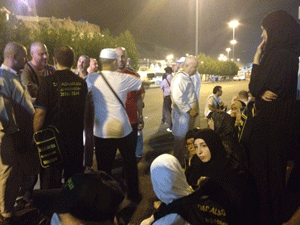A growing chorus of American Muslim voices are predicting a major incident of sectarian violence during the Islamic Hajj in Saudi Arabia this year. The prediction is based upon the increased strife in the Middle East, not only in Syria and Iraq, but in Pakistan and other surrounding regions.
The prediction also is based on the fact that a group of Americans were attacked last year by individuals shouting religiously charged slurs and violent threats, including “our Hajj will be complete once we have killed you, ripped out your hearts and eaten them, and [then] raped your women.” Referencing a brutal episode in history, where the prophet’s family was slaughtered in a land called Karbala, the male attackers also shouted “We’re going to do Karbala all over again.”
While many experts believe that a major incident will occur during this year’s event, which is the first week in October, it is difficult to predict what form it will take. While more than 14,000 Americans travel to Hajj each year, the total gathering comprises approximately 3 million individuals from nearly every country in the world. Accordingly, the perpetrators of violence could be of any race or country.
Unfortunately, it is easier to forecast who the victims of such an attack are likely to be. Extremists are likely to target religious minorities present at Hajj, such as Shiites, or citizens of Western countries, such as the United States, England or Canada.
Terrorists, such as those affiliated with the Islamic State and their ideologically similar counterparts, have released multiple public statements seeking to sow discord, in places such as Saudi Arabia, and with groups including Shiite Muslims. Brazen sectarian attacks in relatively peaceful countries such as India and the first ever “Anti Shia Alliance” Convention in Indonesia also lend to the strong likelihood of violence at this year’s Hajj ceremonies.
During last year’s incident, Americans from Michigan contacted Saudi law enforcement, who confiscated the phones of group members and deleted video footage, and left the group to fend for themselves. With nowhere else to turn, the group members, all U.S. citizens, contacted the U.S. embassy only to be told, “We can’t help you unless someone is dead.” It is unclear what assistance could be provided after actual deaths of American citizens, and the Consular Affairs of the State Department ironically advises that Americans should contact Saudi law enforcement in the event of trouble.
The Saudi Royal Family famously prides itself as the “custodians” of the Grand Mosques of Makkah and Medina, however there have been attacks against pilgrims on a regular basis for the past several years. In some incidents, the attackers were Saudi security personnel, acting out on sectarian rivalries.
This year, the Universal Muslim Association of America (UMAA), one of the largest Shia Muslim organizations in the United States, released a Hajj travel advisory, which ominously warned “Do not reveal personal information, such as your beliefs or sectarian affiliation to strangers or even security personnel. Also, keep private any information about your citizenship. Remain private in your interactions with others, and avoid public confrontations or arguments. If any particular situation feels threatening or dangerous, gather your group members and leave the area immediately.” (Disclosure: I am affiliated with UMAA.)
Last month, Muslim Advocates, a national legal advocacy and educational organization based in California, put together a coalition letter signed by 27 groups asking Secretary of State John Kerry for increased protections during the Hajj ceremonies.
“It is critical that our government protects all citizens and supports them when their rights are violated — both here and abroad,” said Mohamed Sabur, director of Muslim Advocates charities program. “We are asking Secretary Kerry to use his diplomatic relationship with the Kingdom of Saudi Arabia to protect American citizens, and to ensure that if Americans are in jeopardy, they can rely on the U.S. Embassy for immediate assistance.”
/129

